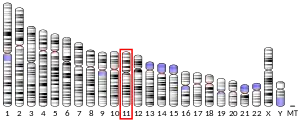182 kDa tankyrase-1-binding protein is an enzyme that in humans is encoded by the TNKS1BP1 gene.[5][6]
Interactions
References
- 1 2 3 GRCh38: Ensembl release 89: ENSG00000149115 - Ensembl, May 2017
- 1 2 3 GRCm38: Ensembl release 89: ENSMUSG00000033955 - Ensembl, May 2017
- ↑ "Human PubMed Reference:". National Center for Biotechnology Information, U.S. National Library of Medicine.
- ↑ "Mouse PubMed Reference:". National Center for Biotechnology Information, U.S. National Library of Medicine.
- 1 2 Seimiya H, Smith S (Apr 2002). "The telomeric poly(ADP-ribose) polymerase, tankyrase 1, contains multiple binding sites for telomeric repeat binding factor 1 (TRF1) and a novel acceptor, 182-kDa tankyrase-binding protein (TAB182)". J Biol Chem. 277 (16): 14116–26. doi:10.1074/jbc.M112266200. PMID 11854288.
- ↑ "Entrez Gene: TNKS1BP1 tankyrase 1 binding protein 1, 182kDa".
- ↑ Sbodio JI, Chi NW (Aug 2002). "Identification of a tankyrase-binding motif shared by IRAP, TAB182, and human TRF1 but not mouse TRF1. NuMA contains this RXXPDG motif and is a novel tankyrase partner". J. Biol. Chem. 277 (35): 31887–92. doi:10.1074/jbc.M203916200. PMID 12080061.
Further reading
- Nakajima D, Okazaki N, Yamakawa H, Kikuno R, Ohara O, Nagase T (2003). "Construction of expression-ready cDNA clones for KIAA genes: manual curation of 330 KIAA cDNA clones". DNA Res. 9 (3): 99–106. doi:10.1093/dnares/9.3.99. PMID 12168954.
- Nagase T, Kikuno R, Hattori A, Kondo Y, Okumura K, Ohara O (2001). "Prediction of the coding sequences of unidentified human genes. XIX. The complete sequences of 100 new cDNA clones from brain which code for large proteins in vitro". DNA Res. 7 (6): 347–55. doi:10.1093/dnares/7.6.347. PMID 11214970.
- Sbodio JI, Chi NW (2002). "Identification of a tankyrase-binding motif shared by IRAP, TAB182, and human TRF1 but not mouse TRF1. NuMA contains this RXXPDG motif and is a novel tankyrase partner". J. Biol. Chem. 277 (35): 31887–92. doi:10.1074/jbc.M203916200. PMID 12080061.
- Jikuya H, Takano J, Kikuno R, Hirosawa M, Nagase T, Nomura N, Ohara O (2003). "Characterization of long cDNA clones from human adult spleen. II. The complete sequences of 81 cDNA clones". DNA Res. 10 (1): 49–57. doi:10.1093/dnares/10.1.49. PMID 12693554.
- Beausoleil SA, Jedrychowski M, Schwartz D, Elias JE, Villén J, Li J, Cohn MA, Cantley LC, Gygi SP (2004). "Large-scale characterization of HeLa cell nuclear phosphoproteins". Proc. Natl. Acad. Sci. U.S.A. 101 (33): 12130–5. Bibcode:2004PNAS..10112130B. doi:10.1073/pnas.0404720101. PMC 514446. PMID 15302935.
- Ballif BA, Villén J, Beausoleil SA, Schwartz D, Gygi SP (2005). "Phosphoproteomic analysis of the developing mouse brain". Mol. Cell. Proteomics. 3 (11): 1093–101. doi:10.1074/mcp.M400085-MCP200. PMID 15345747.
- Seimiya H, Muramatsu Y, Ohishi T, Tsuruo T (2005). "Tankyrase 1 as a target for telomere-directed molecular cancer therapeutics". Cancer Cell. 7 (1): 25–37. doi:10.1016/j.ccr.2004.11.021. PMID 15652747.
- Chang P, Coughlin M, Mitchison TJ (2006). "Tankyrase-1 polymerization of poly(ADP-ribose) is required for spindle structure and function". Nat. Cell Biol. 7 (11): 1133–9. doi:10.1038/ncb1322. PMID 16244666. S2CID 12416419.
- Beausoleil SA, Villén J, Gerber SA, Rush J, Gygi SP (2006). "A probability-based approach for high-throughput protein phosphorylation analysis and site localization". Nat. Biotechnol. 24 (10): 1285–92. doi:10.1038/nbt1240. PMID 16964243. S2CID 14294292.
- Olsen JV, Blagoev B, Gnad F, Macek B, Kumar C, Mortensen P, Mann M (2006). "Global, in vivo, and site-specific phosphorylation dynamics in signaling networks". Cell. 127 (3): 635–48. doi:10.1016/j.cell.2006.09.026. PMID 17081983. S2CID 7827573.
- Gelmini S, Quattrone S, Malentacchi F, Villari D, Travaglini F, Giannarini G, Della Melina A, Pazzagli M, Nicita G, Selli C, Orlando C (2007). "Tankyrase-1 mRNA expression in bladder cancer and paired urine sediment: preliminary experience". Clin. Chem. Lab. Med. 45 (7): 862–6. doi:10.1515/CCLM.2007.133. PMID 17617028. S2CID 22726749.
This article is issued from Wikipedia. The text is licensed under Creative Commons - Attribution - Sharealike. Additional terms may apply for the media files.



